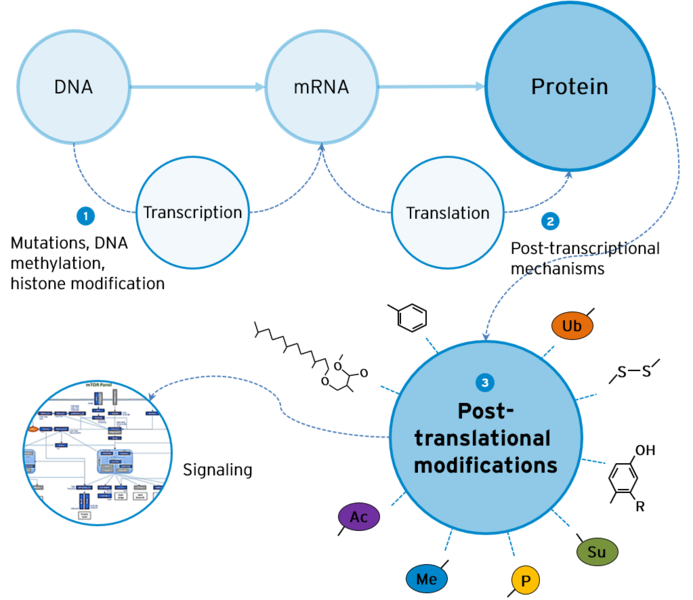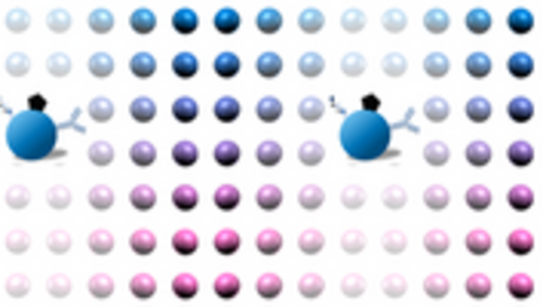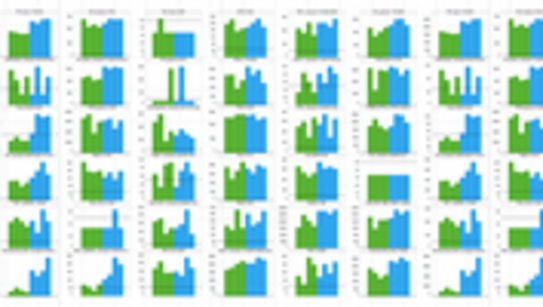
Protein Profiling Services
Protein profiling adds value beyond genomics. Even though genomic approaches became extremely popular in the last decades, protein information is missed using those methods. Studying proteins and, equally important, posttranslational modifications, has proven to contribute significant value.

Serving science in translational research and drug development
Understanding a drug's mode of action, discovering a disease's mechanism, or identifying biomarkers - to achieve success as a scientist requires deep insights into the underlying molecular processes and a precise understanding of biology. We have accumulated a wealth of expertise in establishing and conducting protein assays for quantitative biology. Choose an application to discover more:
Which Protein Profiling Platform is Best?
There is no “one-fits-all”, as all protein profiling technologies come with their own specific pros and cons. Having accumulated years of expertise in the field, we do know a lot about this, such that we can assist you with our advise to pick the platform that is best for your needs. Identifying the most appropriate technology is a crucial decision leading to a successful research project.
Below is an overview of a few key aspects to consider when deciding on the right method.
Choose by application
Over the past >20 years we have been designing and conducting numerous protein profiling studies at all stages of the drug discovery process. Therefore, we can offer strong technical, strategic and scientific support that will help you successfully advance your projects.
Choose by other factors
Number of analytes: Some platforms are limited to analyzing just a few analytes, while other methods offer more scalable studies. Please see the table below for summary.
Nature of analytes: Luminex is focused on total proteins, whereas the strength of DigiWest and RPPA lies in our ability to profile total and phospho proteins (and other PTMs), with long lists of pre-validated antibodies being available. Luminex or Simoa are ideal for cytokine assays, while our cross-species TXP assays are focused on CYP enyzmes, drug transporters, as well as DILI and DIKI markers. And our pre-defined assay lists are not limiting, as we have a strong expertise in validating new antibodies and developing new assays.
Number or nature of samples: Depending on how many samples and what type of samples you want to test, some methods are best for 4-80 samples, whereas other platforms offer more scalable studies. Similarly, some of the methods can just operate with cell culture or tissue samples, while others are also for plasma/serum, urine, and CSF. Look at the table below to spot the differences.
Sensitivity: Some studies require ultra-sensitive methods; depending on your needs we can find the best service for you. Scroll further down and choose the service of interest to learn more.
If you need help with your decision, fill out our contact form or write us an email. We will soon get back to you and help you identify the best approach.
Biomarker identification approaches are all too often based on conventional DNA- and RNA-centric methodologies. Although this is of course not "wrong", there is increasing evidence of cases with obvious disconnects between genomic constitution and protein level data. Furthermore, cell signalling functions through phosphorylated proteins, so wouldn't it be great to also address phospho proteins in your biomarker discovery experiments?
We are experts in protein profiling, and with our proprietary DigiWest® platform we have now a tool in hand that allows for biomarker discovery on the protein level - using pre-validated antibodies for more than 1,200 total proteins and post-translational modifications (PTMs) like phosphorylations. Which finally allows to identify phosphoprotein biomarkers.
High-content protein profiling
DigiWest enables analyses of up to 800 total & phosphoprotein analytes, thus being a great technology for biomarker discovery on the protein level. Click on the picture below to get more information, or contact us directly to discuss your needs.
We are experts in biomarker research
We offer protein profiling services for the whole process of biomarker development. High-content protein profiling for early phases and high-throughput protein profiling services for later stages of biomarker development.
Building on a long-standing track record in immunoassays, we offer contract research services in development, validation, and screening of biomarker assays to our clients, for both pharmacokinetic (PK) and pharmacodynamic (PD) markers.
Test your biomarkers in higher sample throughput
Both Luminex and RPPA allow for scalable throughput, so both are ideal for screening. RPPA focuses on cell signaling proteins, while Luminex' strength is on plasma proteins (e.g. cytokines, chemokines). For the latter, extra sensitivity is achieved with Simoa assays.
We are experts in biomarker research
We offer protein profiling services for the whole process of biomarker development. High-content protein profiling for early phases and high-throughput protein profiling services for later stages of biomarker development.
A deep understanding of a compound’s mode of action (MoA) is crucial for the development of any medicine. Analyzing a broad range of total and phospho proteins will provide protein signatures that help you understand therapeutic action and that may point to side effects.
Comprehensive protein profiling for deeper insights
Our extensive antibody lists for DigiWest and RPPA cover multiple cell signaling pathways, therefore facilitating mechanistic compound profiling and pathway mapping. Our pathway activity panels allow you a simplified selection of analytes relevant for your study. Choose below to discover more.
We serve all stages of drug development
We offer protein profiling services for different stages of drug development. The services vary from high-content protein profiling, high-throughput protein profiling, ultra-sensitive protein profiling, etc. For protein profiling in clinical studies, we offer services under GCP-like conditions.
Understanding the biological effects of drugs warrants in-vivo studies. Every sample in those studies is precious and therefore, it is extremely important to get the most information out of it. We offer multiplexed protein assays to do so.
Multiplexing to understand your in-vivo samples better
Multiplex marker assays from animal samples can be run based on DigiWest, RPPA or Luminex technology. Choose between the methods to discover more. In case you have a question, contact us directly. We can advise you on first-hand.
We serve all stages of drug development
We offer protein profiling services for different stages of drug development. The services vary from high-content protein profiling, high-throughput protein profiling, ultra-sensitive protein profiling, etc. For protein profiling in clinical studies, we offer services under GCP-like conditions.
We provide a range of ADME/Tox relevant assays, with an emphasis on cross-species translatability. i.e. we have specialized in protein marker assays for several animal models. Our goal comes from the 3Rs: We want to enable our clients to get the most out of their safety and toxicology studies.
Add valuable protein information
Luminex and Simoa are ideal for biomarker and cytokine assays, while our cross-species TXP assays are focused on CYP enzymes, drug transporters, as well as DILI and DIKI markers. Choose below to discover more, or contact us directly and we find out together what the best fit would be.
We serve all stages of drug development
We offer protein profiling services for different stages of drug development. The services vary from high-content protein profiling, high-throughput protein profiling, ultra-sensitive protein profiling, etc. For protein profiling in clinical studies, we offer services under GCP-like conditions.
Finding the appropriate assay can sometimes be tough. Commercial assays may often not be available for a particular analyte of interest, not for a certain study species, or not for a specific sample type. With many years in setting up custom immunoassays, we develop and validate assays on demand.
Building the right immuno-assay for your study
In addition to long lists of established assays for each of the technologies below, we also offer development, validation and screening of custom and homebrew assays to our clients.
Clinical research starts with testing for safety and expands further to determine if the treatment is effective. Our protein profiling offerings can support Phase I, Phase II and Phase III clinical trials with monitoring pharmacokinetic (PK) and pharmacodynamic (PD) markers.
Analyses performed under GCP conditions
Simoa and Luminex profiling studies can be conducted under GCP conditions, RPPA can be offered under GCP-like conditions. We have been successfully audited by two top10 pharma companies and one top5 clinical CRO.
We serve all stages of drug development
We offer protein profiling services for different stages of drug development. The services vary from high-content protein profiling, high-throughput protein profiling, ultra-sensitive protein profiling, etc. For protein profiling in clinical studies, we offer services under GCP-like conditions.








